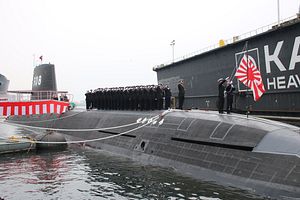Japan’s advanced Soryu-class diesel-electric submarine program crossed an important milestone on Thursday. The country has launched JS Oryu, the first submarine in the class to use long-endurance lithium-ion batteries, accomplishing a long-sought capability designed to give the submarines an extra acoustic edge during sensitive operations and combat operations, Nikkei Asian Review reports.
The addition of the capability also speaks to the innovative capability of Mitsubishi Heavy Industries and Kawasaki Shipbuilding Corporation. The two Japanese firms have worked to promote the Soryu overseas since Japan’s lifting of its decades-long self-imposed ban on arms exports in 2014. In 2016, Japan’s Soryu offering was edged out by French submarine maker DCNS’ Shortfin Barracuda-class in Australia’s Collins-class replacement program.
JS Oryu was launched on Thursday in Kobe, ahead of its planned delivery to the Japan Maritime Self-Defense Force in 2020. The 84 meter, 2,950 ton vessel is the first of the Soryu-class to use lithium-ion batteries on board. According to open source estimates, the vessel can reach speeds of 20 knots.
The addition of lithium-ion batteries to diesel-electric submarines provides a hybrid propulsion capability of sorts. Submarine stealth relies primarily on a low-observable acoustic signature; simply put, submarines need to be quiet to be undetectable by sonar. Moving components in diesel-electric engines generate undesirable vibrations that reduce the stealthiness of submarines.
While diesel-electric engines have the advantage of being able to be totally shut down — a capability that nuclear propulsion submarines lack, given that their reactors can’t be shut down at sea — that comes with the obvious drawback of limiting maneuverability given the limited capacities of traditional lead-acid batteries. (Air Independent Propulsion technology presented one method of bypassing these limitations, but with its own safety challenges.)
Lithium-ion batteries bridge that gap, allowing operators to shut off the primary diesel-electric power to switch to batteries for longer-endurance propulsion during sensitive operations. Battery operations can, in theory, significantly reduce the acoustic signature of a given submarine, making them harder to detect. The batteries also have the added bonus of extending the submarine’s range.
The batteries had generated some trepidation among prospective foreign buyers, who were concerned about possible safety issues related to their use.
For now, the advancements in the Soryu‘s capabilities will mainly be felt by Japan, which is rapidly pursuing more advanced military capabilities amid concerns about China’s rise. Under the Trump administration, Tokyo has felt pressure to increase its procurement of U.S. military equipment, forcing the Japanese government to make difficult decisions about spending on domestic innovation and foreign procurement. In any case, Japanese defense budgets have been steadily increasing under Prime Minister Shinzo Abe.
“It is important for us to continue to introduce sophisticated equipment, including American equipment, so that Japan’s defense capability can be strengthened,” Abe had told Trump last week, during a one-on-one meeting in New York City on the sidelines of the United Nations General Assembly.

































